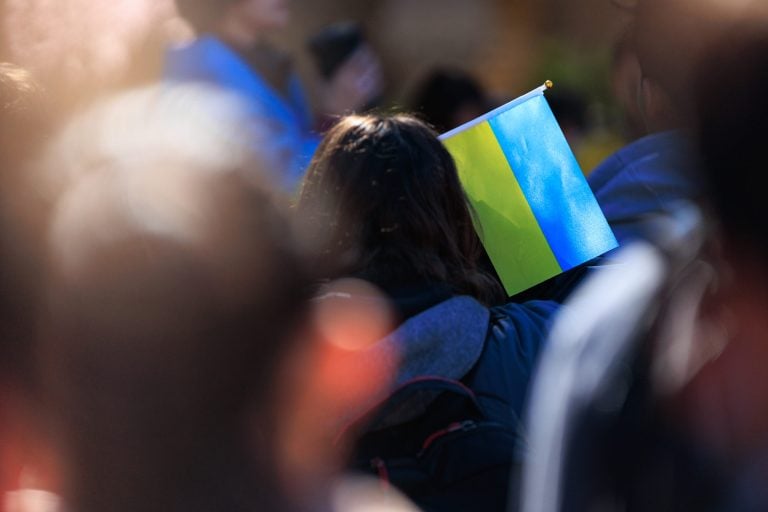For Catarina Buchatskiy ’23, thinking of Ukraine evoked memories of late summer nights walking through Kyiv, on cobblestone streets lined with chestnut trees. It was her favorite place in the world — “a city that’s never fully quiet.”
Yet, waking up to news that Russia invaded Ukraine on the morning of Feb. 24, 2022, Buchatskiy said she felt “the most fear [she’d] ever felt in [her] life.”
The Ukrainian Student Association at Stanford (USAS) organized a rally at White Plaza on Friday to mark the one-year anniversary of Russia launching a large-scale military operation into Ukraine, an invasion which would quickly escalate into a war across the country. Around 100 people gathered to hear speeches about students’ personal experiences and the war’s political importance.
Co-founder of USAS Andrei Molchynsky MBA ’23, who grew up in Ukraine, said he still has many family members there, including a cousin who is fighting in the war.
“It is still very real, very raw, unfortunately,” Molchynsky expressed. “Very personal.”
Since students first organized USAS in Nov. 2021, the organization has “become something quite special,” according to Molchynsky. The group has raised nearly $6 million and delivered 32 tons of medical supplies to Ukraine, including three ambulances.
USAS partnered with the VR company ASPICHI STUDIO and the Stanford Virtual Human Interaction Lab. They provided the content and hardware, respectively, to organize headsets that showed scenes from several Ukrainian cities that bring the viewer “closer to the war zone” and “get Silicon Valley closer to Ukraine.”
“People feel like they are very far from Ukraine,” Molchynsky said. “We just wanted to bring Ukraine a bit closer and particularly showcase to people the consequences of this horrible war.”
Anna Siamionava ’26 told The Daily that seeing the aftermath of Russian attacks in Ukrainian cities in the VR experience was “quite painful.”
Sierra Duren, a video editor at the Stanford Center for Professional Development, said in her speech that despite not being Ukrainian nor a student at Stanford, she felt compelled to volunteer with USAS when she saw the “appalling, horrifying” events on Feb. 24 last year.
“There’s nothing too small that you can do,” Duren said. “There is all of the possibility in the world to be able to make a difference, even if it’s not your country. You want to look yourself in the face in the mirror and say, ‘I tried to do what was right and I tried my hardest, just because I saw it and I saw that it was wrong.’”
Molchynsky said he “vividly” remembered the “surreal” feeling of Feb. 24 last year, when he felt like being “in bed for two days and [didn’t] know what to do.”
But he said he pushed past this feeling by working with USAS in the past year, learning that “the best remedy to helplessness is action.”
Senior fellow at the Freeman Spogli Institute for International Studies (FSI) and the Hoover Institution and political science professor Larry Diamond ’73 M.A. ’78 Ph.D. ’80 called for increased military aid to Ukraine with more powerful weapons and larger supplies of ammunition in his speech.
“These are not just military imperatives, they are moral imperatives,” Diamond said. “This is what we owe Ukraine for bearing the global burden of defending freedom. Putin has thrust this ugly war on all of us. Ukraine must win.”
In his speech, FSI Senior Fellow Francis Fukuyama emphasized the importance of optimism, pointing out that Ukraine is still fighting more than a year after the Feb. 24 Russian invasion, despite predictions that it would be defeated in two or three days.
Despite his optimism, he did not downplay the scale of the war.
“The fight there is not just over this one country,” Fukuyama said. “It’s a larger struggle between tyranny and democracy, in which the freedom of everybody is threatened if this one dictator manages to get his way.”
Former president and prime minister of Mongolia Elbegdorj Tsakhia, currently a visiting scholar at the Freedom Spogli Institute, spoke on the far-reaching “frontline” of the war, and a Ukrainian victory’s potential to generate a “great wave of freedom.” He noted that international cooperation was “solid”: two days prior, 141 countries in the United Nations General Assembly voted in support of Ukraine, just as 141 countries had condemned the Russian invasion in March 2022.
Molchynsky said that for many Ukrainian Americans, the sentiment is that “the war’s not over” and that USAS hoped that the rally would help make sure “people don’t become indifferent to this.”
“We still need the world to pay attention, because it’s not just any other conflict,” Molchynsky said. “There are many conflicts in the world, but this one is different because a lot of the world order that we’ve enjoyed for the last few years, it’s what’s at stake. It’s a kind of clash of civilizations, clash of values, and we have no choice but to prevail.”
